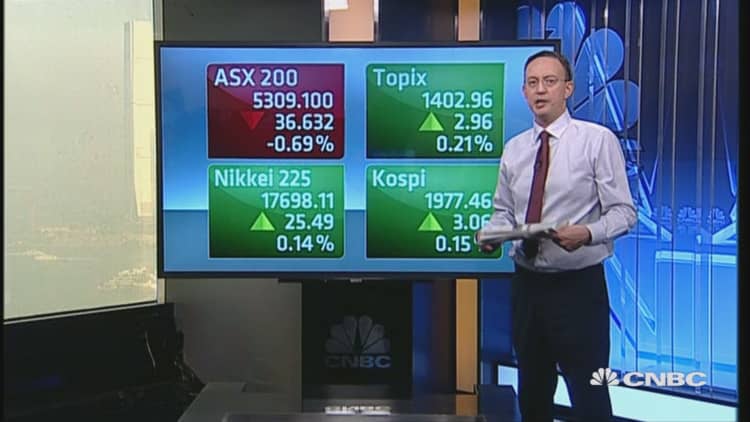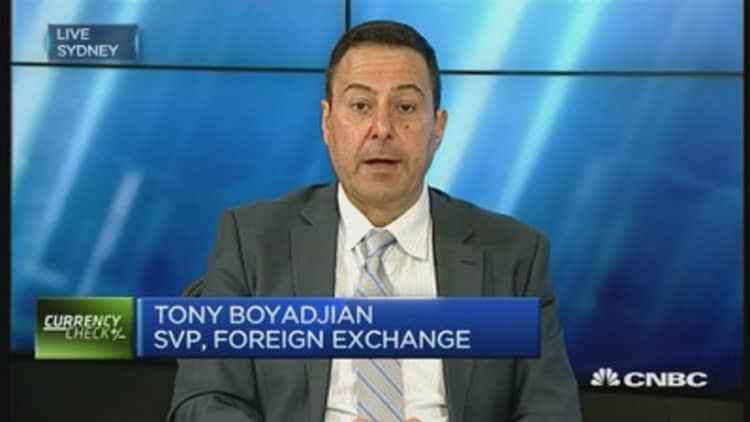Asia markets were mixed Tuesday, as investors eyed the dollar for guidance amid growing expectations of a Federal Reserve rate hike in December.
Australia's ASX 200 closed down 0.37 percent, or 19.53 points, at 5,326.2, dragged by its materials sub-index, which was down 1.05 percent, and its healthcare sub-index, which was down 1.53 percent.
"The implied probability of a December rate hike has surged to 92 percent, so this morning we saw some profit taking and unwinding of activities," Margaret Yang, market analyst at CMC Markets, told CNBC. A hawkish Fed policy stance is generally a negative for emerging markets, as it makes dollar-denominated debt more expensive and spurs investment outflows.
The finished near flat, down 0.03 percent, or 4.47 points, at 17,668.15, likely taking its lead from the yen's direction. The yen hovered around the key level of 108, fetching 108.30 per dollar as of 3:06 pm HK/SIN, after initially trading as high as 107.76 earlier.

"Although Japanese GDP growth more than doubled expectations in the third quarter, dollar/yen rose as high as 108 [as] Trump's victory was a game changer for the dollar and stocks," said Kathy Lien, managing director of FX strategy at BK Asset Management, in a note on Tuesday.
"Hitting 110 is not only possible but likely for dollar/yen but rather than chase the move it may be smarter to wait for a pullback towards 107," she said.
The closed down 0.11 percent, or 3.64 points, at 3,206.73, while the Shenzhen composite was up 0.477 percent, or 10.01 points, at 2,124.4. China is due to release its October foreign direct investment (FDI) figures later in the day. Meanwhile, the softened to 6.8598 against the greenback as of 3:04 pm HK/SIN, after falling to its weakest since January 2009 at 6.864.
The Kospi ended down 0.35 percent, or 6.87 points, at 1,967.53, while Hong Kong's gained 0.3 percent as of 3:05 pm HK/SIN.
"Southbound funds flowing into Hong Kong's stock market via the Hong Kong-Shanghai stock had accelerated yesterday. Trading activities will probably pick up in anticipation of the launch of the Hong Kong-Shenzhen stock connect this month," CMC Market's Yang said.
In stock news, Hanjin Shipping gave back earlier gains as high as 11.2 percent, to trade up 3.55 percent, after Monday's news that Korea Line was picked as the preferred bidder to buy the embattled shipper's Asia-U.S. operations.
Meanwhile, Samsung Electronics shed 0.9 percent after initially trading as high as 1.8 percent, after the electronics giant said it would buy U.S. automotive electronics supplier Harman International Industries for $8 billion.
"Despite limited near-term financial impact from the deal, we expect positive investor responses given Samsung Electronics' answer to market concerns over its next growth driver," said Dohoon Lee, analyst at CIMB, in a note released on Monday.
The dollar index, which tracks the greenback against a basket of major currencies, was 0.18 percent lower at 99.925 as of 3:02 pm HK/SIN. Overnight in the U.S., the dollar index had closed at 100.11, an 11-month high.

, seen as a safe haven asset, traded up 0.46 percent at $1,225.20 an ounce as of 3:03 pm HK/SIN. In the U.S. on Monday, gold prices fell to a five-month low of $1,211.08 an ounce, pressured by a stronger dollar and expectations that the Federal Reserve would raise interest rates in December.
Oil prices were both gaining ground during Asian trade; U.S. crude futures added 1.89 percent, at $44.14 after settling at $43.32 a barrel, while Brent futures at $45.11, up 1.55 percent from its settlement price at $44.43.
Stateside, ended up 0.11 percent at 18,868.69, a new all-time high, while S&P 500 was effectively unchanged at 2,164.2. The composite was down 0.36 percent at 5,218.4.
On Tuesday, the Reserve Bank of Australia released its November meeting minutes, where it kept rates steady at an all-time low of 1.5 percent. The minutes showed that the central bank left rates steady because it was confident that inflation would return to normal levels in time.
— Follow CNBC International on Twitter and Facebook.

